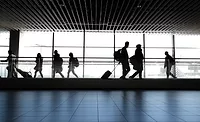Security News -- Airport Security
Sen. Rand Paul Introduces Airline Passengers' 'Bill of Rights'
Sen. Rand Paul (R-Ken.) has introduced a pair of bills taking aim at the Transportation Security Administration: one would establish an air traveler's "bill of rights," while another would replace government-paid screeners with private workers, according to an article from the Los Angeles Times.
The bill would also require the TSA to forward the bulk of the loose change left behind by harried travelers at checkpoints, which amounted to $376,480.39 in the 2010 fiscal year, to the U.S. Treasury for deficit reduction, the article says. Some money would also be set aside to reward workers who present "the most innovative idea to improve the privacy of passengers."
Currently, the loose change is used by the TSA to help fund its regulations.
Paul's proposed bill of rights legislation would give the TSA one year to implement a speedier screening process for pre-cleared frequent fliers at airports with more than 250,000 annual flights, the article says. It would also permit travelers who fail to pass imaging or metal detector screening to repeat it rather than undergo an automatic pat-down.
The bill would also eliminate pat-downs for travelers age 12 and younger and 75 and older unless the screener has a "high degree of suspicion" that the passenger has a prohibited item.
"It seems that every day brings a new account of mistreatment by TSA agents during the screening process," Paul said in a statement. "While aviation security is undoubtedly important, we must be diligent in protecting the rights of all Americans, such as their freedom from being subjected to humiliating and intrusive searches by TSA agents, especially when there is no obvious cause."
The legislation would require the bill of rights to be posted in every airport. Travelers who are selected for pat-downs would have the right to request that the search be administered only by the back of the screener's hand instead of the palm.The bill would also permit parents to stay with their children during screening, the article says.
The bills have been sent to the Senate Commerce, Science and Transportation Committee for consideration.
Looking for a reprint of this article?
From high-res PDFs to custom plaques, order your copy today!





